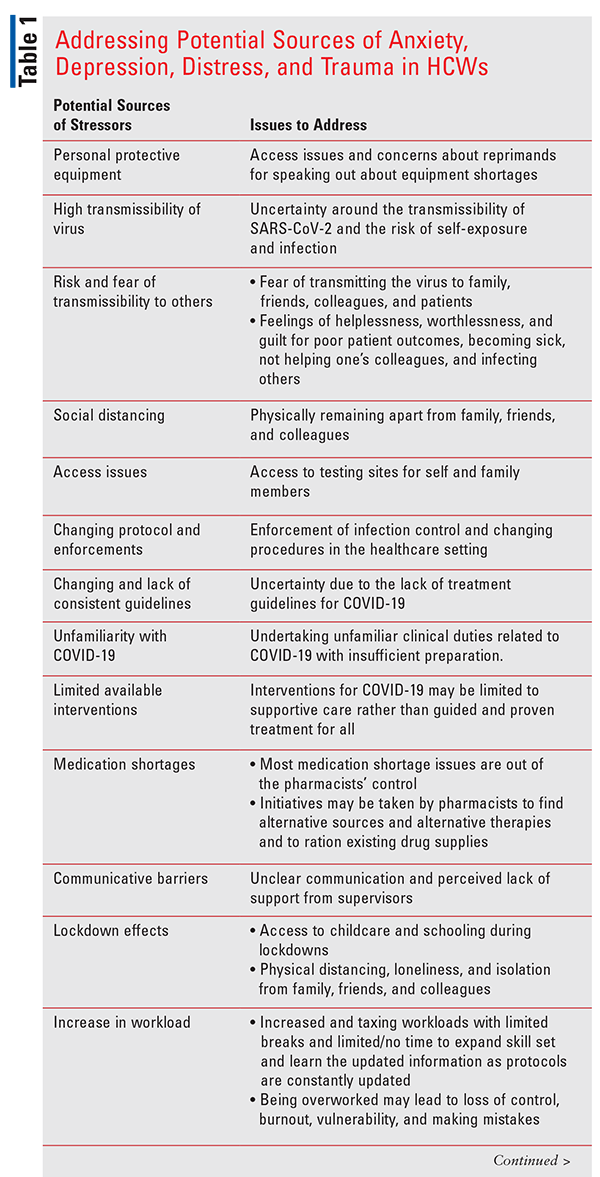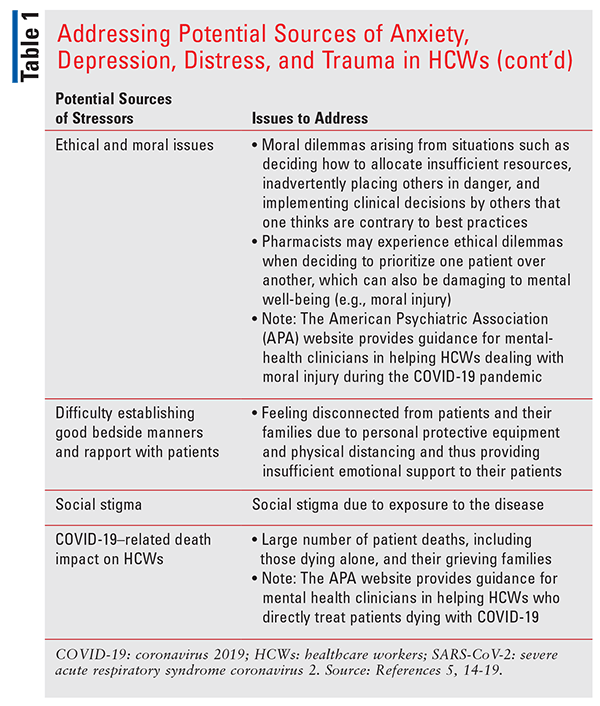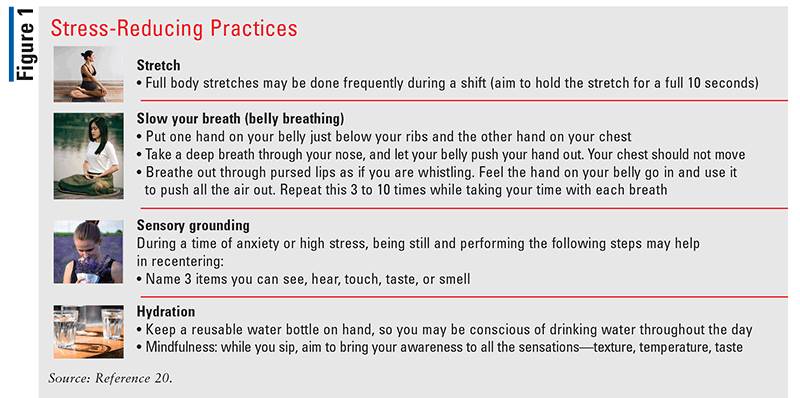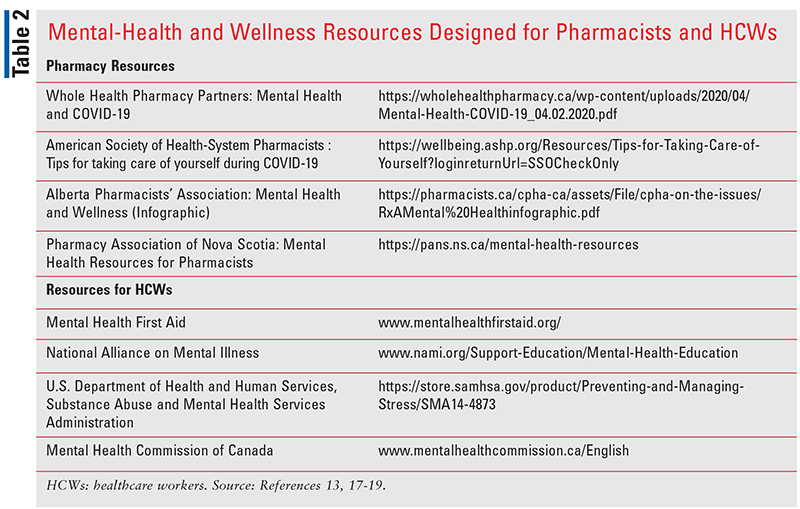US Pharm. 2021;46(6):25-29.
ABSTRACT: Coronavirus disease 2019 (COVID-19) has had a detrimental impact on the mental health of healthcare workers (HCWs). As frontline workers, pharmacists have experienced an escalation in many areas of responsibility, often increasing their burden, frustration, and stress and negatively impacting their mental health and well-being. Although most stress symptoms are temporary, normal, and will resolve on their own, HCWs are likely to benefit from access to mental-health resources that can address sources of anxiety and distress. Awareness of the warning signs of emotional distress and developing practices to alleviate stress may help. Pharmacist managers can encourage self-care and provide pharmacy staff with resources to help them better cope.
Many have felt the consequences of extra pressures brought by the pandemic, especially those on the front lines of healthcare. As the state of emergency was declared many restrictions were implemented, leading to a loss of community due to social distancing and closures of schools and nonessential businesses across the country. These measures were implemented to slow the physical spread of coronavirus disease 2019 (COVID-19), and the mental-health impacts of these measures continue to emerge. Increased workloads for healthcare workers (HCWs), including pharmacy teams, has created enormous stress, and ensuring that support is available for those who need it is a priority. In addition, change is needed to prevent problems by tackling some of the root causes of poor mental health and well-being in the workplace. The challenging conditions increased stress, anxiety, depressive symptoms, and exacerbated pre-existing mental illness. Social isolation is strongly associated with poor mental-health outcomes, especially in the context of COVID-19. These mental-health issues extend to HCWs who treat some of those who are infected.1-5
Pharmacists are among the frontline HCWs working diligently to provide much-needed services during the pandemic. Pharmacist-provided services have been shown to improve patient outcomes and contribute to healthcare savings. Community pharmacists provide COVID-19 screening and medication dispensing to maintain continuity of care, as well as vaccinations and counseling; disseminate critical information regarding COVID-19; collaborate closely with other HCWs and government organizations; engage in home medication delivery; and remain the most accessible healthcare member that patients can interact with. Hospital pharmacists directly support physicians, nurses, and other staff in managing lifesaving medications for COVID-19 patients, participating in patient rounds, and engaging in infectious disease control. Unfortunately, pharmacists may be often overlooked and underrepresented when it comes to recognizing their professional capabilities, support, and needs.6-11
Epidemiology
Several studies describe the prevalence of mental-health sequelae associated with COVID-19 in HCWs. Psychiatric symptoms and disorders can occur in HCWs exposed to COVID-19. This was illustrated in two cross-sectional studies that used self-report instruments close to or during the peak of the pandemic to assess hospital-based physicians and nurses; one study was from China (n >1,200) and another from Italy (n >1, 300), of frontline and second-line HCWs. The prevalence of moderate-to-severe psychiatric symptoms was shown to be: anxiety (12% to 20%), depression (15% to 25%), insomnia (8%), and traumatic distress (35% to 49%).1,2 Another study with a similar outcome consisted of an online survey of Canadian HCWs (n >500, 90% female) in April 2020, which reported that 47% needed psychological support, possibly due to the uncertainty and unpreparedness for a pandemic.3 In contrast, another cross-sectional study assessed nearly 300 hospital-based physicians and nurses caring for patients with COVID-19 in Singapore in February and March 2020, using self-report screening instruments, and found a lower prevalence of psychiatric symptoms.4 Relatively few HCWs in this study screened positive for anxiety, depression, and posttraumatic stress disorder, which the authors attributed to better preparedness of the clinicians based on their previous experience with the 2003 severe acute respiratory syndrome (SARS) epidemic.4
Risk Factors
A recent review helped identify consistent risk factors associated with psychiatric symptoms and described protective factors that may decrease adverse emotional effects. It included 59 studies of emerging viral outbreaks such as the SARS epidemic and COVID-19 pandemic that depicted the psychological impact of HCWs involved in-patient care during these outbreaks.5
The studies suggest that psychiatric symptoms and disorders are more likely to occur in HCWs who are at relatively high risk of exposure compared with workers who are at low risk of exposure. This was demonstrated by a meta-analysis of a subgroup of 25 of the included studies of emerging viral epidemics in which it was possible to examine psychiatric problems in HCWs who had direct contact with affected patients versus HCWs who had little or no contact. The analysis included 16 studies of the 2003 SARS epidemic and five studies of the COVID-19 pandemic. The primary findings included the following5:
• Clinically significant psychological stress was more likely to occur in HCWs exposed to the virus than controls (odds ratio, 1.7; 95% CI, 1.5-2.0).
• Clinically significant acute and/or posttraumatic distress was more likely to occur in workers exposed to the virus than controls (odds ratio, 1.7; 95% CI, 1.3-2.3).
The most consistent risk factor across studies was increased contact with affected patients. Other consistent predictors were a prior history of psychiatric symptoms/disorders and/or general medical illnesses, spending a prolonged time in quarantine, perceived lack of organizational support, and perceived social stigma directed towards HCWs.5
Across studies, the factor that most consistently decreased the risk of adverse psychological outcomes in HCWs was access to personal protective equipment. Other consistent protective factors included having supportive peers, access to psychiatric interventions, and trust in the institution’s infection-control measures, as well as receiving clear communication from supervisors and adequate time off from work.5
Clinical Features
The COVID-19 pandemic may be associated with psychiatric symptoms that do not necessarily rise to the level of a psychiatric disorder, as well as anxiety disorders, depressive disorders, insomnia disorder, and posttraumatic stress disorder. It may also increase the risk of suicidal ideation and behavior, based on studies that found that previous viral epidemics were associated with increased rates of suicide deaths, including suicides that were reported as an adverse effect of quarantine. Among individuals aged 65 years or older, the 2003 SARS epidemic was associated with a 30% increase in suicide. Suicidality related to COVID-19 may be due to the hardships imposed by the pandemic, including economic privation, social isolation, reduced access to general medical and mental-health care, and the stigma of having COVID-19. In addition, the deaths caused by the pandemic may leave HCWs vulnerable to suicide. As a resource note, there is a National Suicide Prevention Lifeline, 1-800-273-TALK (8255), which is a national network of more than 150 local crisis centers, allowing the hotline to provide local resources for HCWs.12
Most stress symptoms are temporary, normal, and will resolve on their own in a fairly short period of time. However, for some people, these symptoms may last for weeks or even months and influence relationships with family and friends, which may indicate that professional help is needed. Common warning signs of emotional distress may include eating or sleeping too much or too little, pulling away from people and things, having low or no energy, feeling helpless or hopeless, worrying a lot of the time, thinking of hurting yourself, or having difficulty readjusting to home or work life.13
Management
The broad range of HCWs who directly or indirectly treat patients with COVID-19 and are at risk for psychiatric symptoms and disorders are likely to benefit from private, on-demand access to mental-health professionals who can address the emotions related to caring for patients. However, HCWs may be reluctant to engage in treatment because of concerns about stigma and problems with licensure, credentialing, and career advancement.5,14-17
Mental-health professionals who are treating psychiatric illness in frontline HCWs should address potential sources of anxiety, depression, distress, and trauma (TABLE 1). The addition of medication or increase in medication is often not needed; listening and talking about ways to manage the physiological reaction to stressors may be the best initial course of action.5,14-17


On the job, there are practice tools that pharmacy managers may share with the pharmacy team to help them cope with the constant change and uncertainty they are experiencing in their work life.
With every new challenge, it is important to share with the pharmacy team that increased responsibility from being frontline HCWs can be accompanied by heightened mental and physical stress and anxiety. Stress may make it difficult to stay present with the task at hand and concentrate effectively. Being aware of this new reality may help better equip pharmacy staff to anticipate the feelings they may experience and develop practices to manage them (FIGURE 1).

Pharmacists’ information-dissemination responsibilities may be particularly stressful. As pharmacists provide up-to-date counsel and education about COVID-19, vaccination, and treatment in an easily accessible way in the community, it is important to keep track of the ever-changing data regarding COVID-19 that is updated regularly. Constant bombardment with COVID-19–related information in a politicized public-health landscape may negatively affect mental health.
Suggestions for coping with this overload include limiting the amount of time spent updating oneself on the information; focusing on data-related information, rather than news-sourced information, because the latter may be fear-driven or misleading. Emphasize the overall outcome or topic when reading information, rather than focusing on details; use adverse-drug- reaction tools and databases (e.g., Lexicomp, Micromedex) to facilitate correction of misinformation.20
Role of Pharmacy Managers
Now more than ever, pharmacist managers can encourage self-care and provide their pharmacy staff with resources and a toolkit to help them better cope. As pharmacist professionals are often those who focus their needs on helping others, it is important during this time for them to address their own needs. HCWs cannot help others if they do not have the energy or resiliency to care for themselves first.
Solutions could include flexible opening hours, which have been helpful in managing workloads and could become a permanent option, rather than just a short-term measure. Establishing the right staffing levels and skill mix in the pharmacy to support safe and effective patient care should be a priority. Moreover, providing opportunities to take breaks, either to relieve the pressure or for the pharmacy team to learn something new, is essential.
Managers should also work with their pharmacy staff to set up a frequent touch-base opportunity to bring up concerns and issues and ways to resolve these challenges as a team. In this way, the pharmacy team may help each other when a member of the team is struggling and create a safe space for all during difficult times. A team-building exercise routine that staff may do before work, during breaks, or after work, can be set up; it could, for example, involve physical/outdoor activity or mindfulness meditation. Virtual community groups and resources can help staff share challenges and successes with pharmacy teams going through similar obstacles while working on the front lines (TABLE 2).20

Conclusion
There is a call to action to address the mental health of HCWs during the COVID-19 pandemic. Pharmacists are frontline HCWs and belong in this category because they provide so many necessary services amid the pandemic. As accessible HCWs, they face many stressors that need to be specifically targeted to address mental-health issues effectively. More focus and resources need to be developed and prioritized to provide solutions for the psychological well-being of pharmacists and HCWs in general amid COVID-19, as well as future disease outbreaks.
The content contained in this article is for informational purposes only. The content is not intended to be a substitute for professional advice. Reliance on any information provided in this article is solely at your own risk.
REFERENCES
1. Lai J, Ma S, Wang Y, et al. Factors associated with mental health outcomes among health care workers exposed to coronavirus disease 2019. JAMA Netw Open. 2020;3:e203976.
2. Rossi R, Socci V, Pacitti F, et al. Mental health outcomes among frontline and second-line health care workers during the coronavirus disease 2019 (COVID-19) pandemic in Italy. JAMA Netw Open. 2020;3:e2010185.
3. Potloc and Canadian Public Health Association. Perception of Canadian health workers around the COVID-19 outbreak. https://potloc.com/blog/en/potloc-study-canadian-health-workers-insights-front-lines-covid-19-pandemic. Accessed February 15, 2021.
4. Tan BYQ, Chew NWS, Lee GKH, et al. Psychological impact of the COVID-19 pandemic on health care workers in Singapore. Ann Intern Med. 2020;173:317-320.
5. Kisely S, Warren N, McMahon L, et al. Occurrence, prevention, and management of the psychological effects of emerging virus outbreaks on healthcare workers: rapid review and meta-analysis. BMJ. 2020; 369:m1642.
6. Cadogan CA, Hughes CM. On the frontline against COVID-19: community pharmacists’ contribution during a public health crisis. Res Soc Adm Pharm. 2021;17(1):2032-2035.
7. Bukhari N, Rasheed H, Nayyer B, Babar Z. Pharmacists at the frontline beating the COVID-19 pandemic. J Pharm Policy Pract. 2020;13(1):8.
8. Elbeddini A, Yeats A. Pharmacist intervention amid the coronavirus disease 2019 (COVID-19) pandemic: from direct patient care to telemedicine. J Pharm Policy Pract. 2020;13:23.
9. Buss VH, Shield A, Kosari S, Naunton M. The impact of clinical services provided by community pharmacies on the Australian healthcare system: a review of the literature. J Pharm Policy Pract. 2018;11(22):1-10.
10. Alves da Costa F, Lee V, Leite SN, et. al. Pharmacists reinventing their roles to effectively respond to COVID-19: a global report from the international pharmacists for anticoagulation care taskforce (iPACT). J Pharm Policy Pract. 2020;13(12):1-3.
11. Elbeddini A, Prabaharan T, Almasalkhi S, Tran C. Pharmacists and COVID-19. J Pharm Policy Pract. 2020;13(36):1-4.
12. Holmes EA, O’Connor RC, Perry VH, et al. Multidisciplinary research priorities for the COVID-19 pandemic: a call for action for mental health science. Lancet Psychiatry. 2020;7(6):547-560.
13. U.S. Department of Health and Human Services, Substance Abuse and Mental Health Services Administration. Preventing and managing stress. https://store.samhsa.gov/product/Preventing-and-Managing-Stress/SMA14-4873. Accessed February 23, 2021.
14. Shechter A, Diaz F, Moise N, et. al. Psychological distress, coping behaviors, and preferences for support among New York healthcare workers during the COVID-19 pandemic. Gen Hosp Psychiatry. 2020; 66:1-8.
15. Zaka A, Shamloo SE, Fiorente P, Tafuri A. COVID-19 pandemic as a watershed moment: a call for systematic psychological health care for frontline medical staff. J Health Psychol. 2020;25(7):883-887.
16. Hall H. The effect of the COVID-19 pandemic on healthcare workers’ mental health. J AAPA. 2020;33(7):45-48.
17. Greenberg N, Docherty M, Gnanapragasam S, Wessely S. Managing mental health challenges faced by healthcare workers during covid-19 pandemic. BMJ. Published March 26, 2020. www.bmj.com/content/bmj/368/bmj.m1211.full.pdf. Accessed May 18, 2021.
18. APA Committee on the Psychiatric Dimensions of Disaster and COVID-19. COVID-19 pandemic guidance document. Moral injury during the COVID-19 pandemic. 2020. www.psychiatry.org/psychiatrists/covid-19-coronavirus. Accessed February 23, 2021.
19. APA Committee on the Psychiatric Dimensions of Disaster and COVID-19. COVID-19 pandemic guidance document. Considerations for healthcare workers and staff exposed to COVID-19 death and dying. 2020. www.psychiatry.org/psychiatrists/covid-19-coronavirus. Accessed February 23, 2021.
20. Canadian Pharmacists Association. Supporting pharmacists’ mental health and wellness during COVID-19. Published May 1, 2020. www.pharmacists.ca/cpha-ca/assets/File/cpha-on-the-issues/SupportPharmacistMentalHealth_EN.pdf. Accessed May 18, 2021.
To comment on this article, contact rdavidson@usharmacist.com.








